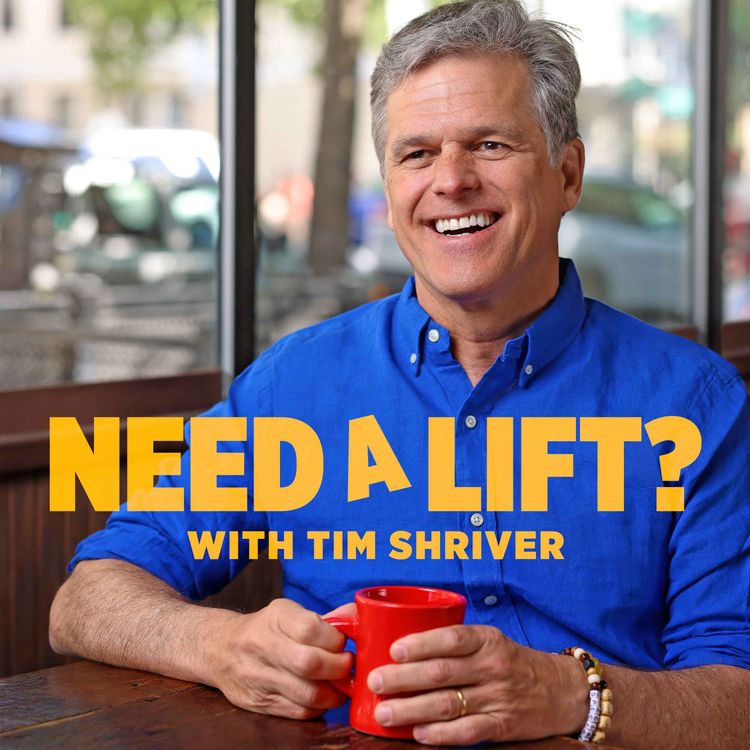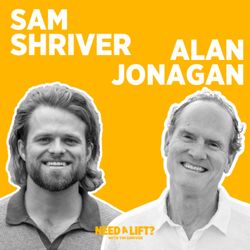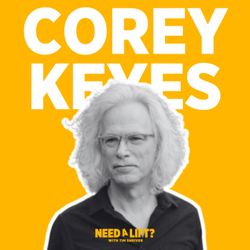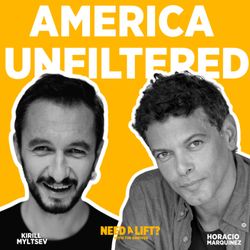Share

Need A Lift? with Tim Shriver
Cultivating Connection Amidst Division
On his hit shows “On the Road with Steve Hartman” and “Kindness 101,” CBS News correspondent Steve Hartman shines a light on the extraordinary human beings he meets across the country, the nuggets of wisdom they share, and the compassionate actions they take in response to the needs of those around them: a girl raising money to grant ‘wishes’ for local nursing home residents, popular kids ensuring students on the fringes never have to eat lunch alone, or a man who simply takes the time to sit and listen to his neighbors. “We all need examples,” Steve says, “We can't just be told to do these things. We need to see people doing them and see the results that they earn before we can really want to internalize it and make it part of our lives.”
In moments when the country feels especially divided–like this election year–Steve’s secret is that he refuses to dwell in negativity. He believes that focusing instead on the very best in humanity, one story at a time, especially in news coverage, is the key to finding our way back to one another. “You put seeds out there and they may not grow right away. A seed can sit in the soil for 20 years and still come up,” Steve says, “Changing our course starts with empathy…and helping others.”
***
Steve Hartman has been a CBS News correspondent for almost thirty years. He’s best known for his weekly feature segment “On the Road With Steve Hartman” modeled after the late, great newsman Charles Kuralt’s long-running series of the same name. On the show, Steve shares heartfelt stories about the incredible people he meets as he travels around the country. With the help of two of his kids, Meryl and Emmett, he hosts a segment called “Kindness 101,” airing weekly on CBS Mornings. They cover everything from purpose, altruism, gratitude, and empathy. Stories that are now being used to teach character in classrooms all around the world.
You can find more of Steve’s work on CBSNews.com and watch his stories from On the Road and Kindness 101 on the CBS Evening News and CBS Mornings YouTube channels.
Watch the stories mentioned in this episode:
- Kindness 101 with Steve Hartman: How to find courage (Gerald Hodges)
- Kindness 101: A lesson in listening (Al Nixon)
- 11-year-old girl grants wishes to nursing home residents (Ruby)
- At one high school, no one eats lunch alone (We Dine Together)
- Stories about dads with Steve Hartman and more (George Hartman)
***
Our theme music was written by Andy Ogden and produced by Tim Lauer, Andy Ogden and Julian Raymond. All other music that you hear in this episode is courtesy of Epidemic Sound.
More episodes
View all episodes

From Opponents to Friends: David Axelrod & Karl Rove on Grief and Why the American People Are Better Than Our Politics
48:34|David Axelrod and Karl Rove are two of the most influential political strategists of our time. Axelrod helped shape President Barack Obama's journey to the White House. Rove was "The Architect" behind President George W. Bush's victories. Their careers were built on defeating people like each other in some of the most bitter, high-stakes political battles in modern American history. Yet, despite their history over the years, today they share a genuine friendship. "We were able to build a relationship because even though we gave different points of view about some issues, I've never questioned Karl's patriotism or love of country. And we have this bond because we know that we have shared something much bigger than politics," David says. That something bigger than politics is a shared understanding of what it is to grieve. Both David and Karl have parents who have died by suicide and in this week's episode, Tim talks with them about the shared loss that brought them together, the mutual respect that sustains their friendship, and their advice to a country struggling to stay in relationship across deep divides. At a moment when so many Americans feel disillusioned by politics or estranged from loved ones with different views, David and Karl offer a model of how to disagree without dehumanizing the other person, how to argue and stay connected, and how believing in each other and in America requires moving beyond labels and preconceived notions. "See them as human beings," Karl reminds us, "I don't want to be around people without character, but I'm not going to say that the determinant of their character is their political beliefs."***Karl Rove was the senior advisor and deputy chief of staff to President George W. Bush, and “The Architect” of his presidential victories. He now writes a weekly column for The Wall Street Journal and is a Fox News contributor. David Axelrod is a political strategist and senior advisor who helped shape the message and vision of Barack Obama’s historic presidential campaigns. He hosted The Axe Files and is the founding director of University of Chicago’s non-partisan Institute of Politics. Learn more about Karl’s work on his website rove.com and David’s work at Politics.UChicago.Edu and find The Axe Files wherever you get your podcasts.“Need A Lift?” will be on a hiatus for the summer and back this fall. Follow us on Instagram (@timothyshriver and @needaliftpod) and Facebook and let us know what you’d like to see on the show.***Our theme music was written by Andy Ogden and produced by Tim Lauer, Andy Ogden and Julian Raymond. All other music that you hear in this episode is courtesy of Epidemic Sound.
Redefining Masculinity: Men’s Rites of Passage with Sam Shriver and Alan Jonagan
01:15:03|In the final episode of our four-part Redefining Masculinity series, we turn to one of the oldest tools for transformation: the rite of passage. Across cultures and generations, rites of passage have marked the moment when boys become men—not just physically, but emotionally, spiritually, and communally. But in our modern world, these rituals for men are often missing, leading to issues with addiction, loneliness, rage, infidelity, and disconnection.Today, Tim speaks with two men who have each crossed the threshold into manhood at very different moments in life. These men aren’t gurus nor are they perfect, but they’ve done the inner work and now help others do the same. First, we hear from Alan Jonagan, a grandfather and former banker whose double life unraveled in his fifties. What followed was a painful but redemptive journey through forgiveness, vulnerability, and spiritual awakening, that began with rites of passage. Alan says, “For me, [a rite of passage] was a way to first of all to identify what my core wounds are, process that, and shatter the image of the false self. The true self is always there, but it's just a matter of, how can I find that true self and how can I live into that?” Today, Alan leads Illuman of the Ozarks, a men’s group inspired by the work of Father Richard Rohr working with men in their 40s and beyond who live in Missouri, Arkansas, Eastern Kansas and Southern Illinois. Next we hear from Tim’s son Sam Shriver, who found his way into men's work in his twenties through rugby, ritual, and raw self-reflection. “I had to sort of begin to take down the scaffolding that I had built in myself. And that led into a moment of uncertainty,” Sam says, “[but the rite of passage] is a framework for managing uncertainty—identity uncertainty.” Sam now works leading what he calls “the most potentially problematic demographic”—white, middle-class men ages 18–35—many of whom are isolated, emotionally unformed, and searching for identity. This episode is about what happens to men when rites of passage are forgotten and what becomes possible for men when we bring them back. ***Sam Shriver is a facilitator, mentor, and guide for young men, ages 18-35, those most at risk for causing harm, navigating addiction recovery and identity formation. Through this work, he helps men process their pain and heal physically, emotionally, and spiritually. Alan Jonagan leads the Illuman chapter in the Ozarks (Missouri and Arkansas, Eastern Kansas and Southern Illinois) primarily helping men in their 40s and older confront grief, break generational cycles, and discover a healthier, more human masculinity. Learn more about Illuman on their website, illuman.org. ***Our theme music was written by Andy Ogden and produced by Tim Lauer, Andy Ogden and Julian Raymond. All other music that you hear in this episode is courtesy of Epidemic Sound.
Redefining Masculinity: How Caring For Boys Emotions Builds Resilient & Healthy Men
53:27|Ruth Whippman grew up with her sister in the UK, attending an all-girls school. In adulthood, when she pictured parenting, she usually pictured parenting a daughter. “My life was so dominated by girls and women, and I think I just had no idea how to parent a boy,” she tells Tim. “And then I had three boys.”Ruth is an author and a journalist by trade, so she started to research how gender roles affect the ways we parent our sons. In her book “BoyMom: Reimagining Boyhood in the Age of Impossible Masculinity,” Ruth says that modern boyhood is marked by a mixture of indulgence and neglect. “We have not held boys and men accountable in many important ways, and we've kind of emotionally neglected them,” she says. “And I think it's the combination of those two that leads to this really toxic soup.” Ruth cites research that showed parents giving baby girls roughly twice as much “nurturing touch” than baby boys. “We talk to baby girls more,” Ruth says. “We are more likely to respond to a baby girl's early sounds and cries.”Those subtle signals convince boys over time that their feelings don’t matter. Through writing her book, she interviewed adolescent boys who told her again and again that the pressure to appear strong and tough ate away at their self esteem. “These messages we give to boys aren't just harmful for other people, they're harmful for boys themselves,” she tells Tim. “It's leaving them lonely, disconnected from their emotions… But what we actually know about resilience and toughness is that it comes from being emotionally healthy.”***Ruth Whippman is a journalist, cultural critic, and author of “BoyMom: Reimagining Boyhood in the Age of Impossible Masculinity” and “America the Anxious.” You can learn more at her website RuthWhippman.com or on her Substack, “I Blame Society.”***Our theme music was written by Andy Ogden and produced by Tim Lauer, Andy Ogden and Julian Raymond. All other music that you hear in this episode is courtesy of Epidemic Sound.
Redefining Masculinity: How This Girl-Dad Influencer Found Himself Through Being a Father
58:40|When he was a kid, Simon Hooper says his dad was a calm, constant presence in his life. “I don't remember him ever raising his voice really,” he tells Tim. That stood in contrast to some of his fathers who acted distant around their kids, begrudgingly picking their kids up from the playground and angrily barking orders. But even though Simon’s dad wasn’t “scary” like some other fathers, being open with his dad wasn’t always easy. Only a few months after graduating from university, Simon was surprised to learn that his then-girlfriend, now-wife, Clementine, was pregnant with their first child. “I remember finding out and my knees kind of buckled,” Simon tells Tim. “But the biggest thing for me was telling my parents and more specifically my dad.” Simon and Clementine drove to his parents’ house and had dinner, and then dessert, but Simon was still too anxious to break the news, worried that his dad would be upset or it would change their relationship. It wasn’t until Simon was out the door that he got the courage to come back inside and tell his dad that they were expecting a baby. “He stuck his hand out and he shook my hand and said ‘Congratulations, that is brilliant news,’” Simon says. “A huge moment in my journey to fatherhood was to tell my dad and to kind of… get his blessing.”That was more than eighteen years ago, and Simon is now thoroughly outnumbered as the father of four daughters. In the mid 2010s, in the thick of parenting, he started to notice more and more moms online were making content about their lives and using it to connect with each other. He thought, there are so few dads making this kind of content, but I could be one of the first. His Instagram account @father-of-daughters now has almost a million followers. It’s where he shares his parenting joys and failures, and also tries to “...find some humor in the mundane,” he tells Tim, “because we all go through the mundane as part of parenting.”Nowadays, Simon is proud to be a part of a generation of dads who are more and more involved in their kids' lives, and who reject the idea that fathers should only be stoic heads-of-households. His advice for young dads is to try not to absorb too many external messages about what fatherhood or masculinity should look like. “Don't go into [parenting] with too much of a preconception around what type of father you should be,” he says. “You will learn it as you go.”***Simon Hooper is a Global Operations Director for a consultancy firm in London and the author of the book, “Forever Outnumbered: Tales of Our Family Life.” You can see Simon’s girl-dad adventures on Instagram, with his handle @father_of_daughters.***Our theme music was written by Andy Ogden and produced by Tim Lauer, Andy Ogden and Julian Raymond. All other music that you hear in this episode is courtesy of Epidemic Sound.
Redefining Masculinity: Becoming A Comprehensive Man with Jason Wilson
54:11|In the first episode of our series exploring what healthy masculinity can be for men today, Tim sits down with Jason Wilson, a martial artist, mentor, best-selling author, and founder of The Cave of Adullam, a Detroit-based martial arts academy where boys learn to master not just their bodies, but their emotions. Jason’s work went viral in 2016, inspiring a powerful scene on NBC’s This Is Us. Jason teaches boys to “fight before the fight” by naming what they’re feeling beyond anger, beyond fear, and beyond shame. But before Jason began helping boys fight their inner battles, he had to confront his own. “It became meaningless to train for countless hours [with] no application of what [I] learned to real life,” Jason says, “You don't want to be a black belt in the gym and a white belt in life.”Jason shares what it means to become a “comprehensive man,” one guided by the good in his heart, rather than fear of how he could be perceived. Jason believes that faith, courage, and vulnerability must go hand in hand if men are to heal themselves and future generations. "I let my son see the tears. I let him know when I'm scared. I teach him that no man, no human, is fearless [because] everyone has something that they love, that they don't want to lose,” Jason says, “Yes, we're providers and protectors, but we're also nurturers. We're also lovers. We are also gentlemen as well.”***Jason Wilson is the director of the Cave of Adullam Transformational Training Academy (CATTA) and the author of multiple books, including Cry Like a Man, Battle Cry and his latest, The Man the Moment Demands. His groundbreaking work helping young boys navigate emotional and spiritual challenges was the focus of the award-winning ESPN documentary, The Cave of Adullam produced by Laurence Fishburne. With over 27 years of martial arts experience and nearly two decades dedicated to mentoring African American young men, Jason was recognized for his contributions to his community with the President’s Volunteer Service Award from President Obama. He is also a devoted husband of more than 25 years and the proud father of two children.Learn more about his work with The Cave of Adullam at theyunion.org or on his website, mrjasonwilson.com.***Our theme music was written by Andy Ogden and produced by Tim Lauer, Andy Ogden and Julian Raymond. All other music that you hear in this episode is courtesy of Epidemic Sound.
How to Invest In 'Soul Currency' with Dr. Corey Keyes
51:05|In high school, Dr. Corey Keyes was thriving as a star athlete and top student. Yet, on the inside, he felt numb, restless, and on autopilot. Afraid that this emptiness might follow him forever, he set out to study it and that search became his life’s work. Corey discovered that millions of people are neither mentally ill nor mentally healthy, they are “languishing” and experiencing what he did as a teen. “Languishing is the absence of negative symptoms as well as the absence of well-being or positive symptoms,” Corey explains, “You don't feel anything bad, but you don't feel much of anything good. You're sort of stuck in between.” In this episode, Corey talks to Tim about how languishing is a gateway for mental illness, and how we can move toward its antidote flourishing—not by chasing happiness, status, or achievements–but by investing in what he calls our “soul currency.” Through small, intentional practices (like connecting with others, serving our local community, and making time for leisure), we can build emotional resilience and restore our spark. “We prioritize the external path to well-being thinking it alone will feed our soul, but it won't,” Corey says, “Place your energy and your time in things that feed the sense of aliveness [because] when we are good and do good things in the world, we feel alive.” ***Dr. Corey Keyes is a pioneering sociologist and professor emeritus at Emory University, best known for coining the terms languishing and flourishing, concepts that have reshaped how we understand mental health today. He is a member of an advisory board for the World Happiness Forum and the Positive Psychology Network. His work has had wide-reaching policy implications. He has worked with the Centers for Disease Control and Prevention and his model of mental health as a complete state has been used by the Public Health Agency of Canada in a national surveillance program. His latest book, Languishing: How to Feel Alive Again in a World That Wears Us Down is available now.***Our theme music was written by Andy Ogden and produced by Tim Lauer, Andy Ogden and Julian Raymond. All other music that you hear in this episode is courtesy of Epidemic Sound.
America, Unfiltered: Documenting the Soul of a Nation
45:55|“What does it mean to be a true American?” That’s the question filmmakers Horacio Marquinez and Kirill Myltsev asked thousands of people during a nine-month road trip across America at the height of the pandemic. Their journey became America Unfiltered, a raw, resonant documentary capturing voices from people in Las Vegas, El Paso, Atlanta, Washington, D.C. and beyond, including gun owners, undocumented immigrants, grieving mothers, conspiracy theorists, and queer couples. They weren’t chasing headlines or politicized caricatures, but the truth. And sometimes that meant stepping outside of their comfort zone and personal beliefs. “You cannot fight other people's principles by silencing them or just not talking to them or hating them,” Kirill shares with Tim, “If some principles have been broken, you can restore them [through] conversation.”In the end, what Horacio and Kirill discovered wasn’t a single story of America, but a kaleidoscope of contradictions: freedom and fear, pride and pain, hope and heartbreak. America Unfiltered isn’t about being right or even having all the answers. It’s about being authentic, honest, and real, and in a divided country, they found that listening may be the most radical act of all. As Horacio explains, “I don't know what your reality is, so I cannot explain to you what your reality is. You tell me what your reality is.” ***Horacio Marquinez is a cinematographer, director, and photographer from Panama who has made over 40 full length films across the globe. He’s a graduate of Columbia University's Film School and has worked on many independent films, commercials, and major motion pictures, collaborating with renowned directors, producers, and actors such as Robin Williams, Adrien Brody, Dolly Parton, Vera Farmiga, Milla Jovovich, and David Corenswet. He received the Best Cinematography Award at the Milano International Film Festival. Kirill Myltsev is a commercial and narrative film editor born and raised in Moscow, Russia. He has edited over a dozen feature films and worked on dozens of International and American commercials and films. He holds a Master's in Film Directing and an MBA from the University of Moscow. Learn more about the filmmakers’ work at their websites:Horacio MarquinezKirill MyltsevAmerica Unfiltered is now available to stream on Amazon Prime, Tubi, Hoopla, and Kanopy.An excerpt from Let America Be America Again by Langston Hughes was used by permission of the Estate of Langston Hughes and International Literary Properties LLC.***Our theme music was written by Andy Ogden and produced by Tim Lauer, Andy Ogden and Julian Raymond. All other music that you hear in this episode is courtesy of Epidemic Sound.
Why Story-Telling Is the Operating System of the Human Brain
52:24|For John Bucher, storytelling matters. It’s how we make sense of the world around us and define the boundaries of what we think is possible, and he’s spent a lot of time exploring how the Hero’s Journey, a model for telling epic stories of individuals experiencing adventure and triumph first defined by the academic Joseph Campbell, can help us see our own journey to personal growth and self-discovery. But John says that the Hero’s Journey shouldn’t be treated as the only or ultimate model for storytelling. “It's still about an individual ego on its own journey,” John tells Tim. “And so a few years ago I started to consider a better story, a new story, and that's the collective journey of all of us.” John started to research moments in history when groups of people came together to make a change, and how we narrate those experiences. “I think looking at these stories of how we've accomplished big things in the past by coming together as a collective can be quite inspirational to us, but it can also teach us how people found their individual roles,” John tells Tim. By telling stories about groups, we can better understand how we can work collectively for common goals, and better understand the small part we can all play. “I'm not going to be the star or the main character… because there is no main character,” John says. “We're all going to be the main characters.”***John Bucher is a mythologist, an author, and the Executive Director of the Joseph Campbell Institute. You can find his work, including his books on storytelling, at his website, tellingabetterstory.com.***Our theme music was written by Andy Ogden and produced by Tim Lauer, Andy Ogden and Julian Raymond. All other music that you hear in this episode is courtesy of Epidemic Sound.
Seeing Your Kids For Who They Are: On Autism, Play, and Parenting with Anxiety
38:25|Before his autism diagnosis, Susan Senator didn’t know why her first born son Nat didn’t act like the babies in her parenting books. “I mean, he was beautiful,” she tells Tim. “But… he did everything differently than what I expected.” Susan put in intentional work to better understand Nat and her two younger sons, Max and Ben, getting to know her kids' distinct personalities through how they played: one son wanted to line the toys up in a perfect row, another wanted characters from different universes to team up. “I was constantly learning,” Susan says.Susan decided to write about parenting and autism, in part so other parents could understand their kids better as the early 90s, when Nat was first diagnosed, was what Susan calls “the autism stone age,” a time when understanding and acceptance of autism was rare. Since then, she’s written op-eds, essays, and three books, all with a central message: “You're not gonna deny that it's hard, but you have to know that this is great, right here as it is,” Susan says. "That's why I write. I want them to see Nat as he is– this full person.”Susan’s journey towards understanding her children holistically hasn’t stopped since they’ve all grown up and moved out of the house. Being a mom of three creative sons means supporting them through many goals, whether that’s in graphic design, playing music in a band, or competing in Special Olympics. For Susan, it’s all been worth it. “I think a [great mom] sees her kids… really sees them for who they are,” she tells Tim. “You let whatever they are come at you and the sooner you get it, the better.”***Susan Senator is a journalist, a public speaker, and the author of the book, “Autism Adulthood: Strategies and Insights for a Fulfilling Life.” You can learn more about her work on her website, susansenator.com.***Our theme music was written by Andy Ogden and produced by Tim Lauer, Andy Ogden and Julian Raymond. All other music that you hear in this episode is courtesy of Epidemic Sound.